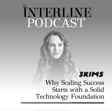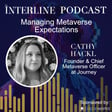Become a Creator today!Start creating today - Share your story with the world!
Start for free
00:00:00
00:00:01

Sneakers, Sustainability & The Secondary Market
For this episode of The Interline Podcast, Ben talks to Moses Rashid, CEO of The Edit LDN, about resale, the future of brand-consumer relationships, and how technology - including AI and digital collectibles - is fundamental to fashion's future in both predictable and unexpected ways.
This episode is sponsored by SOURCING at MAGIC, the leading North American and international destination event. The Interline will be partnering with SOURCING at MAGIC again this summer, to bring the full spectrum of fashion technology to life - across education sessions, live discussions, exhibitors and demonstrations - all in a dedicated fashion technology community, live in Las Vegas, from 7th to 9th August 2023.
Transcript
Sneakers as Stocks
00:00:02
Speaker
Think of a sneaker much like an asset class or a stock and a share. The price of that shoe, of course, fluctuates on a daily basis. And every single size in every single shoe has a different price to it.
Secondary Market Dynamics
00:00:18
Speaker
Welcome to the Interline podcast. In this episode, we're going to be talking about the secondary market, which is a catchall term you can slice a lot of different ways.
00:00:27
Speaker
It's about circularity, giving products the longest possible lifespan through pre-love programs and platforms. It's about scarcity, speculation, resell.
00:00:38
Speaker
It's about building channels and relationships that transcend the initial transaction. It's about minimizing fashion's spiraling impact on the environment. The way I choose to look at the secondary market is as a microcosm for a lot of what fashion tries to do with new product, just with the complexities of design, sourcing and manufacturing stripped out. And when you step aside from those considerations, you're left with some essential priorities. Intelligent demand sensing and pricing, product authentication and brand identity.
00:01:06
Speaker
provable sustainability, and the big ticket question of what fashion might look like when brands are forced to simply make less stuff.
Guest Introduction: Moses Rashid
00:01:15
Speaker
To debate some of those points and more, I'm joined for this episode by Moses Rashid. He's the CEO of The Edit London, which is billed as being a global online destination for limited sneakers and high-end streetwear. Now, before we get to mine on Moses' conversation, which is tech-centric in some ways that might just surprise you, I'd like to talk for a moment about our sponsor for this show. Now, before products make it to the secondary market, there's just as much innovation and technology-driven transformation taking place in the processes of creating new products.
00:01:45
Speaker
in sourcing, manufacturing, and across the entire extended product lifecycle. So much innovation, in fact, that it can be tricky to keep track of, whether you're new to fashion technology as a whole, or whether you're working on diving deeper into a particular area like sustainability or digital product creation. The fashion industry moves fast, and fashion technology moves even faster.
00:02:06
Speaker
That's why the Interline is partnering again with Sourcing at Magic, the leading North American and international destination event to bring the full spectrum of fashion technology to life across education sessions, live discussions, exhibitors and demonstrations, all in a dedicated fashion technology community live in Las Vegas from 7th to 9th August 2023.
00:02:26
Speaker
as well as bringing together brands, retailers, manufacturers, suppliers and service providers to conduct the core business of fashion and connect the industry's value chain. Sourcing at Magic in August 2023 will be home to three educational communities, fashion entrepreneurship, sustainability and social good, and fashion technology, with the Interline proud to be the on-site partner for the latter.
00:02:47
Speaker
Registration for that August event in Las Vegas will open soon, and I hope I'll see you there.
The Edit London: Origins and Growth
00:02:52
Speaker
In the meantime, you can find out more at www.sourcingatmagic.com, or by reading the Interline's collaboration with Sourcing at Magic, who sponsored this episode, titled Future Proofing Fashion Through Technology, which you can find by searching on the Interline. Now, back to my conversation with Moses.
00:03:08
Speaker
Moses, welcome to the show. I'd like to start. Give us an idea of where your idea for the Edit London came from and how it scaled as quickly as it has. What's it been like running the business for the last year or so?
00:03:23
Speaker
Yeah, I mean, it's been a really interesting ride. For me, I've kind of built and sold a few businesses and very different industries. But I guess the idea, I was at a sneaker festival, purchasing some sneakers for about kind of six, 700 quid. I asked a very simple question, do you have a plastic bag for me? And the response I got back was no. And it just blew my mind. I was paying a premium, but not getting
00:03:51
Speaker
premium service. So as I walked away that day, I just thought to myself, look, what actually exists in market? And I looked at other marketplaces. And of course, to call out, there's the market for StockX and GOAT, which are global behemoths. But what I didn't see
00:04:08
Speaker
anywhere was premium. And again, what does that mean? It was really about product curation. It was about speed, and then obviously lumped in with a healthy portion of service. And so that, I guess, is where the other loan came from. And then as we've continued to grow at a rate of about 5%, 600%,
00:04:29
Speaker
you know, year on year, you know, we've really doubled down into those kind of three core pillars to really, you know, get focused on our target audience, really understand what they need, what they want, you know, and obviously kind of technology, our evolving tech's kind of been at the core of that in terms of how we've really kind of been able to build our value proposition.
Operations and Partnerships
00:04:54
Speaker
Awesome. Let's just walk back a little bit then. Let's just talk about how the business operates. More specifically, where you fit into the relationship between sellers and buyers as a marketplace, what your roles and responsibilities are as an intermediary, and how you go about adding that premium layer, how you go about doing the other bits to fit with it.
00:05:13
Speaker
And tell us a little bit as well about some of the department store partnerships that you now have, the NBA partnership that you now have, because those are different things from the kind of global behemoths you were just talking about.
00:05:28
Speaker
Yeah, so I guess maybe if I take a step back and just for those that maybe aren't aware of the edit London and you know, hopefully you are. We're the most premium sneaker streetwear collectors marketplace globally. Now, about 70% of our revenue came from econ. But actually, as you've mentioned there, Ben, you know, we've got
00:05:47
Speaker
a huge pool. We've got a piece of our business which I guess sits within concession stores and then private shopping. So those concessions being you know the likes of Harrods in London, Galleria La Follette, Doha, Harvey Nichols and Riyadh and soon to be in Amsterdam also. Now I guess if we go back to the earlier question I kind of talked about product curation so you know what's our relationship between you know the buyers and the sellers. Now part one is of course we
00:06:16
Speaker
of course, we connect the two, but we want to make sure that our buyers get the coolest and the hottest product at the right price. So part one is about really being able to harness the top level of reseller, if you like. And when I talk about that, I mean, you know, we don't necessarily focus on the people who have, say, one or two products to sell. Really relationships tend to sit with the people that have got, say, 50 or 100 units to sell or more and actually operate like small businesses
00:06:47
Speaker
get access to early products before others. So for example, right now what's super hot at the moment is the Tiffany Air Force One. They actually release, I believe it's the first or the second week of March.
Sneaker Market Intelligence
00:07:01
Speaker
And actually we've been selling in-hand pairs. So normally what happens when a sneaker drops, there's early release pairs that are out in market. We've actually managed to get a hand on a whole bunch of them. I think we sold about 10 or 15 of them just last week.
00:07:15
Speaker
to give you an idea. And of course, our customers have got them in hand already. So again, what's that relationship is about? Making sure we can provide access. So make the inaccessible accessible, if you like, in the slickest, smoothest way possible through our platform, of course.
00:07:34
Speaker
And of course, with every single item that needs to be authentication, that happens in the middle. So of course, once that sale goes through, the item comes to edit London HQ, and then of course, is checked through, you know, through our, you know, through our, you know, robust authentication process, which includes, you know, there's an element of manual through to, you know, the AI tech that we use to kind of ensure that every product is the right product using various data points. And I know, you know, we'll talk a little bit more about that.
00:08:05
Speaker
And then, of course, ensuring that the customer is communicated to them, obviously, we get that to them. But with MBA partnerships, I think you're referring to the Chicago Bulls there, right? I am, yeah.
00:08:20
Speaker
That was something about five months ago, I thought to myself, look, we're really going to take on the US. Consider it a statement of intent. How are we going to really break open the market, make people stand up and take a look at what we're doing from
00:08:39
Speaker
I guess what you can consider a pretty competitive marketplace. We approached Chicago, we started having some really interesting chats and now think of that from having instated media, having official designation on a global level, through to
00:08:58
Speaker
We've got an asset, for example, which is kind of the walking series, which is really, really cool. So in the U.S., it's all about, you know, what these what these ballers are wearing. And so, you know, we've done a huge piece around that. And of course, we are the presenting partner for the Chicago Bulls game against the Toy Pistons in Paris for London Fashion Week. Sorry, for Paris Fashion Week.
00:09:20
Speaker
You touched a little bit on the overall limited edition drop model, and you talked about early access pairs, things along those lines. Let's walk back a tiny bit further for anyone who's not familiar with just how the sneaker aftermarket works, if you like, and how pricing operates, and how that cycle works.
00:09:42
Speaker
Everyone's aware largely of the whole sneakerhead hype culture that exists. Everyone's aware that limited editions and collaborations are a major deal. I don't think everybody necessarily realizes just how mature a market this has become because, like you said, you're not just talking about individual resellers, you're talking about actors who operate like a small business, you're talking about a very comprehensive, very mature, very well-rounded secondary market here, right? Exactly that,
Tech and Authentication in Sneakers
00:10:11
Speaker
yeah.
00:10:11
Speaker
So I'd like to ask your question as well. Do you look at the Edit London as being a tech company, a fashion company, or a bit of a hybrid of the two? Because if you take a step back and think about it, you've got an app, you have a platform, you have an SDK, you have algorithms, all of those are the kind of things you would associate more with a technology company than a retailer, or necessarily with a marketplace. What's your take on that? How do you define yourself?
00:10:38
Speaker
Really simply, I mean, we're a tech business. It's just the currency that flows through the tech is sneaker streetwear and collectibles.
00:10:47
Speaker
You know, that idea of us being a fashion company. I mean, you could call us a fashion brand, if you like, by way of some of the, you know, the PR that you'll see. But ultimately, we're a technology business and, you know, everything, all the tech that we've kind of enabled here is built proprietary since the beginning. And you get what you need to do so.
00:11:09
Speaker
Okay, perfect. So let's talk a little bit more about the tech then. And I want to start with something that you and I've mentioned prior to this conversation, which was the automated market tracking. So I believe you have a proprietary solution that scrapes a bunch of data points around pricing, that then confers some benefits onto sellers, it gives them some new insights, and it confers some benefits onto you at the Edit London, because it enables you to do automatic calculation of your margin. And
00:11:39
Speaker
That's emblematic of a much broader trend towards pricing intelligence and market intelligence that exists across the whole footwear industry, across the apparel industry as well. Tell me why you went about doing it that way and tell me how you did it.
00:11:54
Speaker
I think your previous question, when you talked about off-the-market pricing, think of a sneaker much like an asset class or a stock and a share. The price of that shoe, of course, fluctuates on a daily basis. Every single size
00:12:13
Speaker
almost every size in every single shoe has a different price to it, i.e. UK4 will be a different price to UK8, for example. So that, of course, becomes that there's market volatility based on, of course, supply and demand of said pair or indeed said size. So for us, part one was about just trying to understand how we're going to be able to control that, because actually what that meant as a business was
00:12:37
Speaker
On some days, the cost of product was much higher than we thought it was just yesterday. Firstly, that was, I guess, delivered the importance part two. We built this tool which simply looked at
00:12:55
Speaker
We looked at all competitive platforms and pulled all of this data from across the net to look at the trends, for example, the market volatility, what we saw as being what we can assess by way of a trend. Can we actually see this product selling further by way of
00:13:15
Speaker
the volume of sales and actually our tech can determine whether or not actually we should start investing more money into that product ourselves because we've got a portion of our of our business which is you know purchases what we refer to as owned by stock whether or not we should start selling so again very much very similar to you know what you would see when people are buying stocks and shares in the city i guess um you know in fact i will apply that to the sneaker world
00:13:42
Speaker
Yeah, that's really great insight. And I think being able to have that level of agility and that level of insight into what your raw costs are, what your margins are, that's something that, again, is emblematic of the broader kind of footwear and apparel industry where everybody's margin, whether you're making product or reselling or buying finished product, your margins eroding because your costs are constantly fluctuating, especially at the moment.
00:14:07
Speaker
And that level of intelligence, that level of insight and visibility is something that I suspect everybody listening to this wishes they could build for themselves. Yeah, yeah, absolutely. And I think what's really interesting is, again, we talk about that, the supply side of our business, so the reseller side, and actually we've got account managers in-house that effectively analyse the data that of course we've just talked about.
00:14:30
Speaker
And then we'll pull that data, push that out to our reseller set, and particularly what we refer to as our baller sellers, who are our top tier of sellers, and say, hey, these are the trends we're seeing. And I suggest that you should go out and buy and acquire and procure these pairs. And then you should put them on our platform at this price. And if you do that, then actually the suggested profit on said products would be X, for example. So actually, our guys are proactively working with our reseller set.
00:15:00
Speaker
to support them in shifting more stock, providing them with better data to make more product, but also saying, hey, we're going to support you in building your business as well. That's really interesting because providing that level of visibility to everybody who has a stake in and everybody who uses the platform is in that benefit for basically every stakeholder there.
00:15:22
Speaker
Yeah, yeah, absolutely. I mean, ultimately, for the customer, and this is all about, you know, what benefits the customer and who, you know, can we get the coolest kicks to that customer as quickly as possible? You know, we want to make sure they've got, you know, options, we want to make sure it's delivered to the right price at the right speed from the right people. You know, so the more transparent and the more proactive we can be with sharing information such as how to market, then then actually again, it only just kind of supports and accelerates it at London's growth.
00:15:52
Speaker
Staying on the tech topic then, you touched on it before, which is authentication and inspection and your use of AI there. You and I had a conversation before and we talked about how you're using artificial intelligence to capture data points to allow you to verify the authenticity of product when it comes in.
00:16:11
Speaker
Tell us a little bit about how that works. That's something you built in-house as well as I understand it. So tell us a bit about how that works, what the process looks like and how that gives you total confidence that the products that go through the Edit London's marketplace are what they say they are.
00:16:31
Speaker
We've built a layer of this tech and this AI that kind of sits within our SDK, if you like, which effectively as a product arrives here at London HQ, it goes through various steps. So there's no manual and then also you've got the
00:16:48
Speaker
you know you've got the AI the automated piece so part one is obviously of course the the the authentication manager will kind of run that product through various tests which you know from a manual level like touch feel smell and and again obviously looking looking the product over at that point
00:17:07
Speaker
It will then be captured via photo and essentially placed in, think of it like a light box or like a similar to MRI scanner, if you like, where effectively the product gets, will get scammed from the top to bottom, left to right. And essentially we'll look at
00:17:26
Speaker
pulling lots and lots and lots of data that's being built into the SDK historically and effectively see if it can find any discrepancies in that product. And again, we use this to essentially
00:17:43
Speaker
support the decision of passing a product or actually support the decision of saying that this product actually there's discrepancy and actually we're going to fail the item, let's say. And so we want it through this kind of vigorous test.
00:17:57
Speaker
Every single product at that point then gets white carded so then we support the database and all of that information similarly gets absorbed into the SDK for the next sneaker that comes through. And then of course at that point it's either passed or it's not. Of course when it's passed it's wrapped up and it's nice packaging and then sent out to customer that day.
00:18:15
Speaker
And that process was really interesting, and it probably sounds like it's quite laborious, but depending on the shoe, it could be anything from say one to three minutes, or say one to five minutes. Very rarely does it need to be any longer than that. Which is interesting, because when you're dealing with the volume of product that I assume you are,
00:18:34
Speaker
you wouldn't want to have a fully manual bottleneck on that kind of throughput. So you're using tech in an interesting way in the sense that it's allowing you to do something at scale that you wouldn't otherwise be able to scale that way. Exactly. And effectively, every single product goes through the exact same check. So for example, when we're putting it through a positioning issue within that kind of MRI scanner, we're white carding the product.
00:19:04
Speaker
you know there are certain positions that the tech effectively will suggest for us to to kind of capture the the images and then it will start doing its magic from there if you like so yeah it's a really interesting piece of kit that absolutely supports our growth and scale and of course on the global level so and of course if there's anything
00:19:28
Speaker
If there's anything that flags, then straight away that's kind of pushed out to the wider team, and then you've got more hands, and then it goes through the same checks again. And at that point, if it's flagged, then essentially that product's discarded and sent back to the seller, and then the team will then procure a new product.
00:19:47
Speaker
Yeah, that makes sense. One other question I had on that side of things. When you identify discrepancies, so you're identifying a discrepancy between the product your team has on hand and what's the frame of reference for discrepancies? Where do you get the original kind of product data that allows you to say, this is or is not an example of X sneaker? Yeah, so again, I mean, you're looking at
00:20:16
Speaker
a wealth of knowledge that gets inputted into a database from product specialists that include, of course, those at the end of London, but those at other reputable platforms and so forth. That gets all pulled into one place. When I say discrepancy, that discrepancy could be a number of things. This piece of tech uses everything from scanning to UV lights and all these
00:20:46
Speaker
you know bits of wizardry but when i say discrepancy it could it could highlight for example the scuff on the shoe it could highlight some glue glue on the lace you know it could be as small as that or actually it can tell you hold up actually the type of glue that's been used
00:21:05
Speaker
isn't consistent with what we'd typically see in, say, a Jordan 1. And actually, then you could run it through another test just to actually see if that, again, is a genuine product as well. That's a great point, because it's not necessarily the broad pieces. It's some of the finer construction details and things like that that would clue you into the fact that something is not a match.
00:21:33
Speaker
Exactly, exactly. This is all under the guise of, again, us being the most premium within our space, need to make sure that when we're sending the product to the end user, that actually we're sending the perfect product. And actually what's really interesting, if I just kind of highlight one of the biggest items that we see queries with, let's call it a QA accused with,
00:22:00
Speaker
is the Dunk Low Panda. So you'd have seen probably on the streets of London, hundreds of people wearing these black and white Nike dunks. And the GS pairs, which is typically what you refer to as grade school or youth sizing, is typically the one that
00:22:17
Speaker
people will turn around and say, hey, is this a genuine product? Or the quality of the shoe isn't perfect, the stitching slightly off. Actually, it's just because actually a lot of the QC and what you refer to as some of that cheaper product, mainly because it's just mass produced, just simply isn't great quality. And so it takes for our team to understand that, to whether or not to actually pass that product along.
Customer Experience at The Edit London
00:22:44
Speaker
That's really interesting. The one other piece of tech I just want to touch on would be, you've talked a bit about it already, which is being the premium player in this space. And that's replicating the kind of brand retail experience and building those sort of customer relationships, which I would look at from a tech point of view as being, if I'm a buyer and I want to purchase something through the edit London,
00:23:11
Speaker
There's an experience I want to have there. I want the same way of engaging with you that I would have with a brand. I want to be able to check how my order is progressing. I want to rely on customer service. There's a whole paradigm of interaction there that is different from the hands-off way that I think people might expect that a marketplace operates. It's about curating that relationship. Tell me how you go about that and how the platform and the tech allows you to build those relationships.
00:23:40
Speaker
Yeah, I think from an automated point of view, you'll get updates daily or by daily on your product journey. So that's part one. Part two, if you talk about the user experience point of view. So on a mass scale, our response time within emails, for example, is 30 minutes. Chatbot, of course, is instant. And then via social platforms, typically within one minute to three minutes. So then we're really holding in on the customer experience. And then if we take another step back,
00:24:09
Speaker
We became the first global sneaker platform to actually launch a same-day service. Now, to give you clarity, that is in a market which typically would take two to five weeks to receive your product. So you put a huge emphasis on how can we get quicker? How can we make it smoother and slicker? And actually, a lot of that, if I take you back to the beginning, a lot of that came down to that day where I thought, blindly,
00:24:33
Speaker
you know, if I'm going to pay a premium for this product, I'm not going to get a premium service, but now I need to wait for, you know, three weeks or five weeks for my show to turn up. It just simply didn't make sense. And so, you know, a lot of this business, but born out of personal personal need, I guess, my own hits quicker than everybody else. But
00:24:53
Speaker
That's what it was. We really hoped in on a couple of things there, which was, we're in an inexperienced economy, so what does that mean? If you think of the model of affluent, it's not necessarily about the price, it's about the experience. If I've got a birthday to go to on the weekend, I just want to find out if my product is actually going to
00:25:15
Speaker
and actually just having that relationship with somebody in the business. And actually our customer services manager, Joseph, who's brilliant, will always kind of drop somebody a call after they've received the products, everything good. Yes, it is. Hey, here's my email. If you need anything, just reach out. Oh, and if you do, let me get my personal shopping team to support you on that. And then they could receive a WhatsApp from a personal shopper here. And suddenly they've got that direct dial.
00:25:43
Speaker
Yeah, and you know, you are honing in very much on the service side of things there, which is something that a lot of brands and a lot of retailers are recognizing can be their secret sauce that can be their differentiator as well. Yeah, yeah, yeah, absolutely. You asked the question, are we a tech business or are we a fashion brand?
00:26:03
Speaker
And actually, you know, a marketplace by nature, of course, is a transactional platform, right? But actually, by way of the brand, you know, I answered the second part of that said, you know, that there's elements of what you could call a fashion brand. But actually, what we do as a business is really focusing on culture and community.
00:26:21
Speaker
And I guess they're the brand leather evidence of why people become intrinsically bought into what we're doing. And actually, the Chicago Bulls is a great piece of that, because that should be thought about. You know, where do we want to see the edit London? Who do we want to see us partnered with? When you think of sneakers, naturally, you think of Michael Jordan. And so I felt like the right thing to kind of go to, you know, the home of, you know, Michael Jordan being the Chicago Bulls. So it's really about how we think about our brand.
00:26:51
Speaker
beyond just being a transactional platform because that is actually not what we are. We're an experienced business which is really catering to the customer need and making things incredibly accessible and in your hands as quickly as possible.
Marketplaces and Sustainability
00:27:08
Speaker
That's perfect. I'm going to shift gears a little bit and I just want to ask you about how you see the importance of marketplaces, both aftermarket and what you might refer to as secondary, circular, pre-loved, that kind of thing. The role of those in reducing the footwear and apparel industry's outsized environmental footprint.
00:27:29
Speaker
Because I know your website prominently displays the amount of virgin plastic saved by resale. Give me your thoughts on what you see as your role there and the broader role of the ongoing secondary market and the circularity in helping to blunt some of fashion's impact on the environment.
00:27:49
Speaker
I think, you know, what's really interesting is that, you know, we really tackled sustainability in three ways. And, you know, we really thought about, like, how can we do that? So part one is that we've got this we've got this huge brand that we know we've got eyes on. So firstly, we need to make sure we're doing our piece. So part one, as you said, we've got a ticker on our site. I think we've already collected nearly half a million kilos of plastic out of the oceans. You know, that's actually every sale that goes to our platform. We collect one kilo.
00:28:19
Speaker
plastic. So part two, of course, was to build our own pre-love marketplace to really drive that circular economy. So we educate from the point of sale. And actually, in the product lifecycle, you can, you'll be able, if you look after the shoe, you'll be able to retain its value, at least to a certain point. So let's call that 50%, or even 100% of the value of that product. And then you'll be able to sell it back through the edit, prelove.com.
00:28:46
Speaker
So just for cloud, we actually built that pre-lover marketplace about a year ahead of our original forecast, because actually we see that as a huge opportunity, but really something where we can kind of fuel this product. And our product is principally luxury, I guess, with the price point of about 360 to 400 quid.
00:29:09
Speaker
back through the market. The next piece in terms of how we deliver that to market was we want to drive a fully circular business. Now, we're at what we call 80% wastage, which actually means we've actually bought a whole load of tech and machinery where
00:29:27
Speaker
As an example, when cardboard boxes come in, we put that through this machine, which effectively turns it into bubble wrap effectively, which we then put into our recycled boxes and then send back out to the end user.
00:29:45
Speaker
it's incredibly important that more and more brands are becoming more sustainably aware. I guess the question is, what is sustainable? I think our role in that, I think you're seeing consumer behaviors changing from buying fast fashion and actually purchasing luxury items or those items that hold its value and actually knowing that, then there'll be a longer life cycle on said product.
00:30:14
Speaker
The next part of that is to make sure that people know where they can sell that product authentically. And actually using pre-loved sites like Vestia, which is a great example, Depop, Vintage, all of these guys who are doing really well. And I guess our pre-loved site is curated perfectly for this respective market. And so when I say that, it's about creating the right types of brands.
00:30:42
Speaker
And then educating that, you know, if somebody buys from us, you know, from day one, that actually will be there to support your next sale, your next sale. And actually, of course, if you sell through the edit pre-loved, we'll give you a £10 credit to spend back on the edit London.com. Interesting. That's good. Good model for stickiness. And I think overall, you know, you hinted at it there. Scarcity is kind of a
00:31:02
Speaker
prescient model in some senses, because there's there's a lot of brands, you mentioned fast fashion, prime culprit, not the only culprit. There's a lot of brands that over produce right fashion as an industry makes too much product. And that kind of model of making a lot of stuff and selling it in high volumes, low cost, it feels like there's a shelf life on that. And I think a lot of brands are realizing that they're going to need to make more limited quantities in the future. And in that sense, this, this whole segment is
00:31:31
Speaker
potentially ahead of the curve and the way that it operates. Yeah, absolutely. I think what's really interesting, and again, if you go back to my earlier point, which is talking about sneakers as an asset class.
00:31:42
Speaker
Over time, the product would typically appreciate in value. I'll give you an example. I purchased a Jordan 1 high trophy room. There's only 12,000 of these sneakers made. I purchased it for 1,700 pounds. I wore it for about a year. Obviously, wore it very lightly in that period, but I then sold it 12 months later. Now, in that 12-month period,
00:32:11
Speaker
The new market price had actually inflated from 1.7 to 3,000 pounds for that particular shoe in that size. So after wearing that product for 12 months, I sold that shoe for over 2,000. I think it was 2.1K. So I actually made 100 pounds on that product, and I've got my 12 months wear out of it. So when you think of it like that, and you think about how they're doing,
00:32:41
Speaker
you know, the, you know, when I talk about investing in the right type of product and investing in, say, luxury fashion versus so fast fashion. I mean, it's really clear to me, you know, where the value sits there.
00:32:54
Speaker
I think so. For a lot of people, that's a prohibitive price point to begin with, but not when you reframe it from the perspective of, like you said, it's something that appreciates over time. Then it starts to become easier to get that consumer behavioral change and that brand behavioral change to make less, to buy less, to buy with the longer term horizon.
Digital Scarcity and Future Trends
00:33:16
Speaker
Yeah, perfect. Um, last question would be, what's your take on digital collectibles, digital scarcity? So, um, you know, we, we know one of the biggest footwear brands in the world has its own digital collectibles marketplace now its own channel. Um, and I think a lot of other brands in footwear and apparel are looking at that model and I'm wondering how that's going to shape out because
00:33:42
Speaker
It's not just a case of having 3D representations of a garment or a sneaker and selling those. It's a question of what does that look like from a scarcity perspective, from limited editions, for collectability, for resale, for royalties. There's a lot of direct parallels and analogues between the physical sneaker model and the digital collectibles model. So I just wanted to get your thoughts on it.
00:34:06
Speaker
I find it a fascinating space actually. We entered that ourselves, we're kind of testing and measuring. We entered the metaverse via blocktopia and we're working on a full kind of proposition about this. But I think, okay, so if we look at something like Nike and artifacts, I think what they did really well
00:34:27
Speaker
They actually attached both the digital and the physical product to it, so they released 10 sneakers between 2000 and 10,000 units.
00:34:40
Speaker
of each shoe, you could forge that product after a 12-month period to receive the real-life item. And actually, it's at that point where the item is so rare, of course, that holds real value. So I think that approach is really interesting. I think for the wider community, people that might be thinking about, well, is this somewhere to invest?
00:35:06
Speaker
I guess really that'll be down for you to turn them, but I kind of think of it like this. So I'm what, 38 now. So I remember when I was a child, you'd go to school and you'd use a pen and a pencil and a notepad. Whereas for the youth today, actually, they're grown up in iPhones, iPads, and so forth. So they're early adopters of technology.
00:35:29
Speaker
I'm going to frame it slightly differently so if you think about brands, so you know Ben I'm not I'm not sure what your fashion styles are but you know when I was 16 we'd go to someone like Top Man to go and purchase a t-shirt and then we went we turned 21 and we all started going to All Saints and then we
00:35:47
Speaker
You and me both on both of those cancers. That's it. Exactly. And then with 25, we started investing brands. I find this really interesting, but actually that trend is not happening from as early as about 12 or 13 years old. Now some of these teenagers are now purchasing designer brands, which hold a bit of value. So let's, in this case, call them sneakers. So they're going to send them on for a profit, making, I don't know, 20, 30, 40, 50 pounds.
00:36:14
Speaker
Now they're getting to an age where they go, okay, well, where, for example, we were a little bit younger, we might've had, let me think, Tamagotchis back in the 90s, I think it was, or the noughties where we had these little computerized pets was the kind of thing, right? But, you know, actually their version of that is an NFT or digital collectible, which they're now investing in. So now they're playing around with that, you know, winning on some, losing on some others, but ultimately building a bit of a stock kind of money.
00:36:43
Speaker
And then suddenly, you hear these stories of how quite young guys and girls have made quite a bit of money in crypto or whatever it might be, or digital art. And that, for me, when I kind of really broke it down and thought about it, I thought, wow, OK, this is really interesting. And actually, as a result, it was kind of where we really started breaking down strategizing. We became the first
00:37:05
Speaker
a global seeker platform to actually start accepting crypto, even though the crypto market's on the floor for a long time. We found it really interesting to say, hey, well, actually, yeah, you can deploy your money here. So to your point, I think
00:37:22
Speaker
As with anything, that requires mass market adoption. I don't think we're there yet. It's still a very niche subsection of the community that, of course, has. But I think inevitably over time, I think we'll get there. Is there anything else that we've not touched on in terms of your thoughts on the intersection of technology and sneakers, the intersection of technology and fashion in general?
00:37:52
Speaker
Well, I think what you're going to see is, and actually, I think it was just this morning I saw a really interesting article around AI being the future of sneaker designers. And so I think what we're going to see, and again, if you break down technology, again, we can talk about tech platforms or the tech that's used to create certain items, like the Nike Space Hippie, which uses, they refer to it as space trash,
00:38:20
Speaker
for example, where it's 100% recyclable. I think we're going to see, continue to see lots and lots of innovation. I think fashion generally tends to be quite forward thinking when it comes to adopting new ideas and new tech. I think the end of London will naturally be the forefront of that change within our respective market, of course, that big speaker streamer.
Episode Wrap-Up
00:38:48
Speaker
Perfect. Well, Moses, thank you so much for your time. It's been great having you. Yeah, no worries. Thank you so much. Thanks again to the sponsor for this episode, Sourcing at Magic. The Interline will be back in Las Vegas this coming August 7th through the 9th to help bring fashion technology to life and to continue to grow the dedicated fashion tech community in North America.
00:39:07
Speaker
So stay tuned for new announcements and new ways to get involved. Whether you're a technology vendor looking to expand your horizons and reach digital decision makers from new and existing audiences. Or whether you're a brand owner, designer or professional who just wants to discover just how much technology can do for you, your colleagues and your brand. Find out more at www.sourcingatmagic.com
00:39:29
Speaker
and look for more from the Interline podcast very soon. And be sure to keep an eye on the Interline itself, because we have stories coming up that touch on a lot of the themes we've talked about in this episode.



















